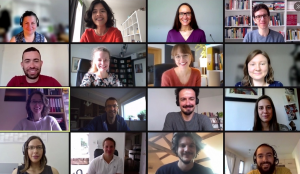By Alina Felder
 Convening virtually over the course of three days (30 June – 2 July 2021), twelve PhD students from six countries exchanged about current research and challenges to researching the area of higher education. The workshop on ‘European higher education in times of uncertainty’ comprised two keynote lectures by senior researchers – Jeroen Huisman and Martina Vukasovic – who shared their invaluable knowledge of working with and on higher education on the first respectively third day of the workshop. Jeroen Huisman (Professor for Higher Education at the Centre for Higher Education Governance Ghent (CHEGG)) provided us with in-depth answers to several questions centring around the choice for approaching higher education theoretically and methodologically. Martina Vukasovic (Associate Professor at the Department of Administration and Organisation Theory, University of Bergen) delivered more questions than answers concerning the definition of Europe, European cooperation in the area of higher education and its measurement.
Convening virtually over the course of three days (30 June – 2 July 2021), twelve PhD students from six countries exchanged about current research and challenges to researching the area of higher education. The workshop on ‘European higher education in times of uncertainty’ comprised two keynote lectures by senior researchers – Jeroen Huisman and Martina Vukasovic – who shared their invaluable knowledge of working with and on higher education on the first respectively third day of the workshop. Jeroen Huisman (Professor for Higher Education at the Centre for Higher Education Governance Ghent (CHEGG)) provided us with in-depth answers to several questions centring around the choice for approaching higher education theoretically and methodologically. Martina Vukasovic (Associate Professor at the Department of Administration and Organisation Theory, University of Bergen) delivered more questions than answers concerning the definition of Europe, European cooperation in the area of higher education and its measurement.
At the core of the workshop each participating PhD did not only share insights from her PhD project, but also provided feedback to one of her peers throughout four thematic panels. Presentations ranged from fully-fledged papers to dissertation monograph chapters and illustrated the great variety of conceptual, theoretical and methodological frameworks higher education researchers have at their disposal. The central issues during the first panel were the role of Universities of Applied Sciences in EU-funded research projects, the correlation between university attendance and pro-European attitudes and the Covid-19 pandemic as a permacrisis. During the second panel the central theme and traditional challenge for higher education institutions was internationalisation, which the doctoral researchers tackle in research projects concerned with cross-border cooperation and transnational alliances among higher education institutions and the European Universities Initiative. The third panel closely connected to the most current and pressing challenges to higher education institutions – digitalisation and the Covid-19. In their presentations PhD scholars focused on Collaborative Online International Learning (COIL), mobility policies in Brexit and Covid-19 contexts and on Covid-19 effects on Georgian higher education. The final panel was concerned with teacher and doctoral education in Germany, which the presenting doctoral researchers explore in projects on the transnational habitus of teaching students, support for PhD students and their employment sector choices.
The workshop underlined how exchanging with peers from all over Europe who are concerned with similar issues in their research does not only bear indispensable value for each individual researcher, but also for the growing community of higher education researchers. While I did present my own doctoral research during the workshop, I learned even more through co-organising the workshop with Anna Prisca Lohse from the Hertie School of Governance and through providing feedback to one of the fellow members of my international cohort of doctoral researchers. The three central things I took away from my different roles as workshop organiser, panel chair, discussant and presenter are:
- The courage to reach out for peers in my research area.
- A lot of enthusiasm to engage with my own research.
- Curiosity to dive into research areas that are not necessarily related to my own.
Ultimately, research workshops are venues where debates and future collaborations are initiated and long-lasting relationships among like-minded scholars nurtured and forged. The fact that we are conducting our doctoral research in times of uncertainty, brings unique contributions to all the research areas that are concerned with issues of higher education – be it educational, organisational or political science.
This post was initially published on Europe of Knowledge blog.

